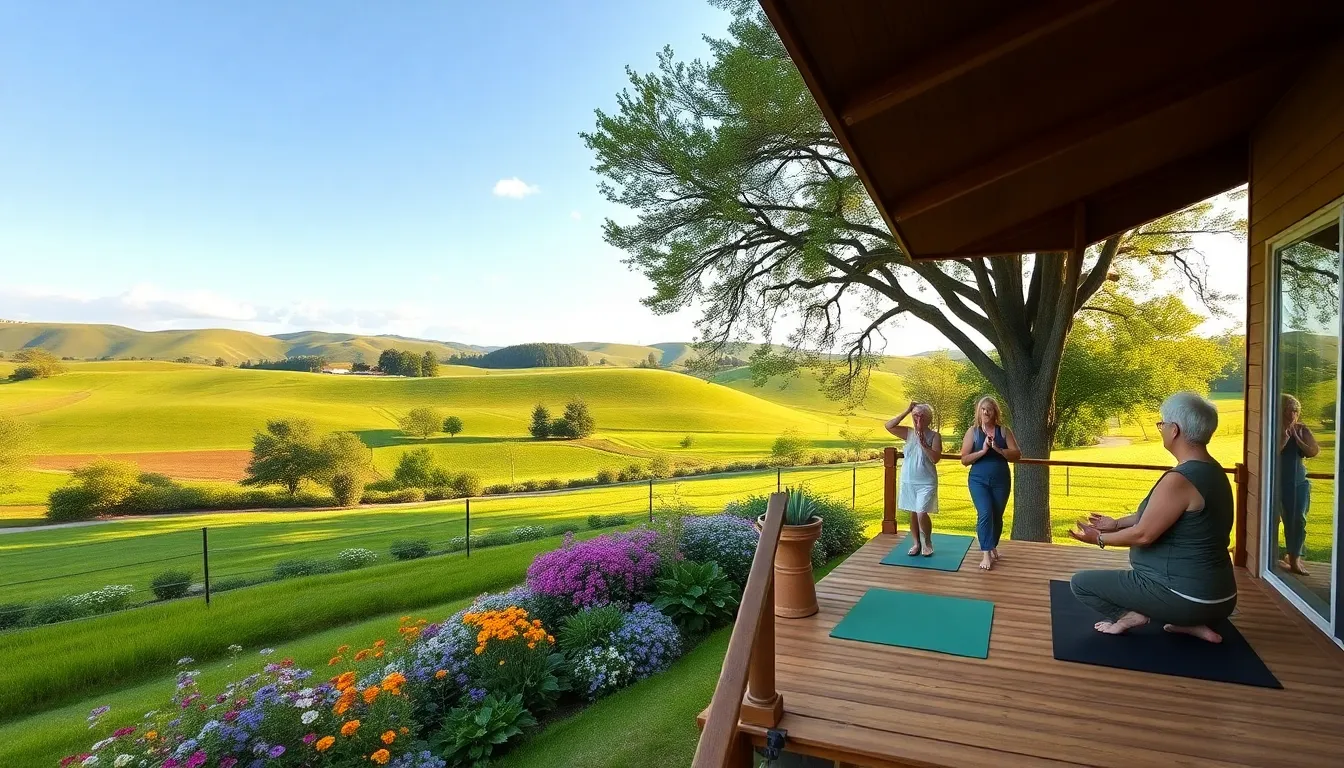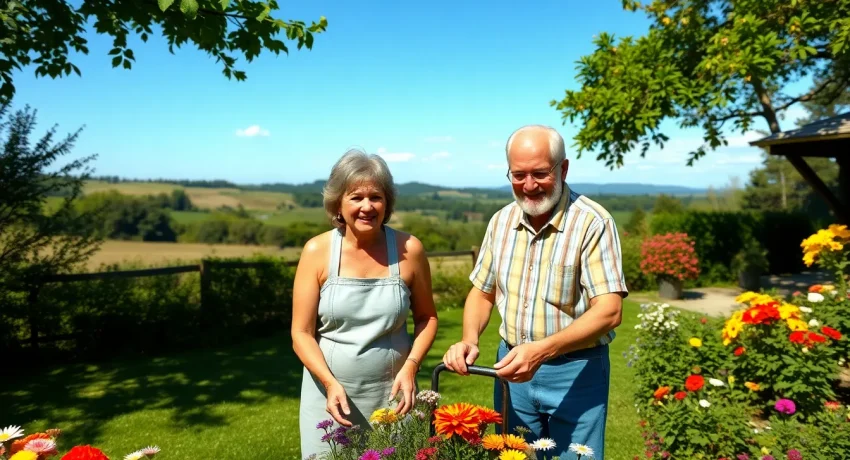Table of Contents
ToggleRetirement living in the country offers a unique blend of tranquility and community that many seek as they transition into this new chapter of life. With its picturesque landscapes and slower pace, rural living provides an ideal backdrop for relaxation and exploration. Imagine waking up to the sounds of nature instead of city traffic, where mornings are filled with fresh air and stunning views.
As retirees look to escape the hustle and bustle, country living presents opportunities for gardening, outdoor activities, and connecting with neighbors. It’s not just about a change of scenery; it’s about embracing a lifestyle that promotes well-being and fulfillment. Whether it’s quaint towns or sprawling farmland, the countryside holds the promise of a rich and rewarding retirement experience.
Overview Of Retirement Living In The Country
Retirement living in the country offers numerous advantages that contribute to an enriching lifestyle. Tranquility defines the rural environment, allowing retirees to experience a peaceful atmosphere away from urban noise and stress. This serene backdrop encourages relaxation and mindfulness.
Natural beauty thrives in the countryside, featuring expansive landscapes, gardens, and diverse wildlife. Retirees enjoy countless opportunities for outdoor recreation, including hiking, fishing, and gardening. Engaging with nature fosters physical wellness and enhances mental well-being.
Community connections flourish in rural areas. Retirees experience a stronger sense of belonging, forming meaningful relationships with neighbors. Local events, farmers’ markets, and community organizations facilitate social engagement, ensuring that individuals remain active and involved.
Affordability often characterizes country living. Housing costs typically remain lower compared to urban centers, allowing retirees to allocate more resources toward leisure activities and hobbies. Accessible amenities, such as grocery stores and healthcare, are often available within a short drive, maintaining convenience.
Overall, retirement living in the country presents a lifestyle that prioritizes well-being, connection, and fulfillment, making it an attractive option for many individuals entering their golden years.
Benefits Of Retirement Living In The Country


Retirement living in the country offers numerous benefits that enhance quality of life. The combination of a serene environment and vibrant community contributes to overall well-being.
Peace And Tranquility
Peace and tranquility characterize country living, promoting relaxation and healing. Natural sounds, such as birds singing and wind rustling through trees, create a calming ambiance. This peaceful atmosphere enables retirees to practice mindfulness and reduce stress. Access to less crowded spaces allows for leisurely walks, meditation, and outdoor yoga, fostering mental clarity and emotional stability.
Natural Beauty
Natural beauty defines the countryside, with scenic landscapes ranging from rolling hills to lush forests. Retirees can engage in gardening, birdwatching, and hiking, immersing themselves in nature’s bounty. Seasonal changes provide unique experiences, with vibrant wildflowers in spring and stunning foliage in autumn. Connecting with nature boosts physical health through increased activity and enhances mental wellness through aesthetic appreciation.
Sense Of Community
A strong sense of community flourishes in rural areas, where neighbors often become friends. Retirees can engage in local events, clubs, and volunteer opportunities, fostering relationships that combat loneliness. The close-knit atmosphere encourages participation in community projects, enhancing social bonds. This supportive network plays a crucial role in creating an enriching retirement experience, making each day fulfilling and connected.
Considerations For Choosing A Location
Choosing the right location for retirement living in the country involves several key factors. Evaluating aspects such as cost of living and accessibility to services is essential for a fulfilling retirement experience.
Cost Of Living
Cost of living varies significantly between rural and urban areas. Retirees should evaluate housing prices, property taxes, and utility costs. Rural areas often feature lower home prices, making it easier to find affordable housing options. For instance, the average home price in a rural area may be 30% less than in a city. Additionally, local grocery and healthcare costs should be considered, as prices can fluctuate based on regional availability.
Accessibility To Services
Accessibility to essential services significantly impacts retirement quality. Retirees need to assess the distance to healthcare facilities, grocery stores, and transportation options. Rural areas may have fewer hospitals, so it’s crucial to check for nearby clinics and specialists. Public transportation availability can also vary; some rural areas lack comprehensive transit systems. Evaluating telehealth options may provide an alternative for accessing medical care in less accessible regions. Furthermore, local community centers and recreational facilities should be researched to ensure active engagement and support.
Types Of Retirement Communities
Retirement communities offer various living arrangements tailored to the needs and preferences of retirees. Understanding the types helps individuals choose the right environment for their retirement lifestyle.
Independent Living
Independent living communities cater to retirees who value autonomy but prefer a supportive environment. These communities provide housing options such as apartments or cottages, promoting an active lifestyle with fewer responsibilities. Residents benefit from amenities like fitness centers, organized social activities, and communal dining options. The focus on independence allows retirees to engage in hobbies, participate in events, and forge connections with neighbors while enjoying peace of mind in a secure setting.
Assisted Living
Assisted living communities serve retirees needing varying levels of assistance with daily activities. These facilities offer tailored care options, ensuring residents receive the support necessary for a fulfilling life. Services typically include help with medication management, personal hygiene, meals, and mobility. Assisted living environments foster social interaction and provide activities that encourage engagement. The combination of assistance and a vibrant community creates an atmosphere where residents can thrive, maintaining dignity while receiving essential support.
Activities And Lifestyle Options
Retirement living in the country offers a wealth of activities and lifestyle options that promote engagement and fulfillment. Retirees enjoy diverse opportunities for recreation and cultural experiences that enrich their daily lives.
Outdoor Recreation
Outdoor recreation plays a significant role in country living. Retirees can partake in activities such as:
- Hiking: Accessible trails provide scenic routes for all skill levels, encouraging exploration and physical fitness.
- Gardening: Ample space and rich soil invite retirees to grow their gardens, fostering relaxation and a sense of accomplishment.
- Birdwatching: Abundant wildlife and natural habitats create ideal conditions for birdwatching, promoting mindfulness and appreciation for nature.
- Fishing: Nearby lakes and rivers offer fishing opportunities, allowing retirees to enjoy peaceful moments by the water.
- Biking: Quiet country roads facilitate leisurely bike rides, providing exercise and exploration in a tranquil setting.
These activities not only enhance physical health but also boost mental well-being by connecting retirees with nature and their surroundings.
Cultural Events And Festivals
Cultural events and festivals in rural areas invite retirees to participate in the community. Common offerings include:
- Farmers’ Markets: Local farmers’ markets promote fresh produce and handcrafted goods while supporting local agriculture.
- Art Shows: Art shows showcase local talent, encouraging retirees to engage with the artistic community.
- Seasonal Festivals: Seasonal festivals celebrate local traditions and harvests, providing entertainment and opportunities to connect with neighbors.
- Music Concerts: Outdoor concerts and local performances create a lively atmosphere where retirees can enjoy music and socialize with others.
- Craft Fairs: Craft fairs highlight handmade items, allowing retirees to support local artisans and discover unique products.
These events foster community connections and provide platforms for social interaction, ensuring retirees feel integrated and engaged in their new environment.




